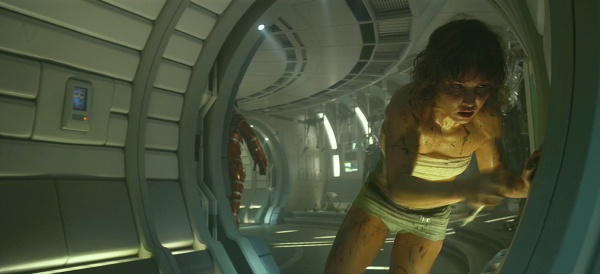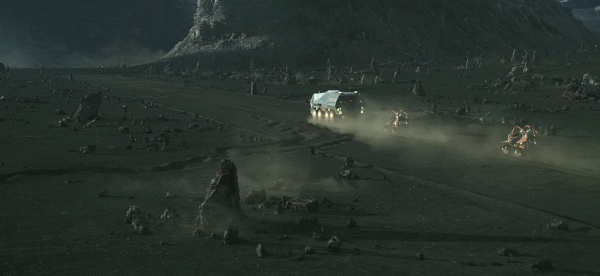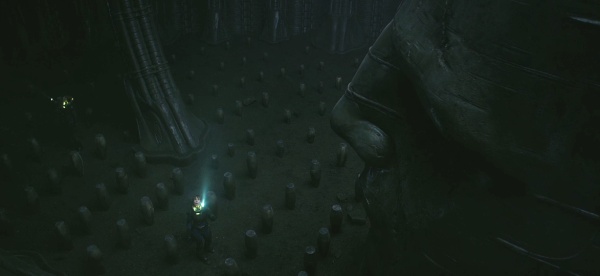Prometheus (Ridley Scott, 2012)

Ridley Scott’s return to science fiction, thirty years after Blade Runner, would be a big deal on its own. That he has returned with a revisitation of the universe of his other science fiction classic, Alien, makes this an even more enticing prospect. Yet there’s a reason the trailers have soft-pedalled the connection to the 1979 film: Prometheus is quite a different film in both intent and execution.
It takes place before Alien, and follows a deep space mission to find a star system that had been depicted in ancient cave paintings. Led by archaeologist Elizabeth Shaw (Noomi Rapace) and the improbably icy project sponsor Meredith Vickers (Charlize Theron), the mission hopes to uncover secrets about Earth’s origins. The team lands on a moon, finds and enters an ancient alien structure, and undertakes an orderly, well organised series of explorations in relative safety things start to go disastrously wrong.
Scott’s original Alien took a very similar opening set-up and turned it into a single-minded exercise in suspense and occasional visceral horror. Prometheus, commendably, is more ambitious. There’s a strong element of Alien-style menace, but Scott also wants to have a try at more thoughtful, idea-driven science-fiction. The film works to some extent on both fronts, but never really gels as a whole: it’s a film more interesting and laudable for what it attempts than what it actually manages.
As a straight horror / adventure movie the film is more notable for a few bravura moments than for its overall effect. There is one sequence, in particular, that will probably enjoy the same kind of instant infamy earnt by the John Hurt chestburster scene in the original film. In this and a couple of other moments Scott achieves a level of intensity that is worthy of Prometheus’ illustrious forebear and which manages to set the film apart from the many science fiction horror imitators that have followed in the intervening thirty-three years.
What Prometheus lacks, though, is the iron grip and sense of sustained dread that Alien maintained: exploring these alien environments just doesn’t feel as scary here. A lot of this can be put down to Scott’s direction: where Alien mercilessly assaulted its audience with unrelenting darkness, haze, disconcerting sound effects, and a truly creepy score, Prometheus‘ style leaves the audience mostly in its visual and aural comfort zone. The special effects give us an expansive video game world rather than the intensely claustrophobic spaces of the original, and if you see it in 3-D the effect is worse still: the characters float pop-up-book-style in front of crisply rendered landscapes. (Why distributors do previews for films in such an unflattering format is beyond me.)

Scott also isn’t served especially well by the screenplay by Jon Spaihts and Damon Lindelof. Particularly early in the piece, there are myriad clunky details and lines that actively dissipate tension. Even by the standard of “space mission gone wrong” films the organisation of the expedition seems weirdly slapdash: most of the crew haven’t met each other or even been briefed as to the mission until after being sedated for the two-year long journey; and while some are hand-picked professionals others seem to be half-baked freelancers plucked Han Solo-style from a bar in Tatooine. I guess the intent was to provide character conflict and tension, but one would assume there would be ample scope for this once characters start biting the dust at the hands of an implacable alien menace. Having a variety of disparate personalities with conflicting goals is all very well, but someone needs to remind Spaihts and Lindelof that not being ridiculous is also a worthy screenwriting principle.
Talk of the script, though, brings us to the other kind of film Prometheus seeks to be, which is a bolder, thought-provoking piece of “proper” science fiction. Here Scott is drawing more on his legacy as the director of Blade Runner. On this score, the film deserves credit mainly for its effort at busting out from the Alien franchise’s established confines into concept-driven science fiction. That is to be applauded, and I don’t want to sound ungrateful by then complaining about what follows.
I have written before, in reference to Danny Boyle’s Sunshine, that it is difficult for deep space mission films to find new conceptual terrain, and certainly Prometheus struggles to do so: we’ve seen many of its big ideas before. (Hell, even Indiana Jones and the Kingdom of the Crystal Skull mined some of this territory). It also struggles with the classic trap of piling mysterious and inexplicable incidents on top of each other to such a degree that they then cannot be resolved satisfactorily. Lindelof has talked about wanting to leave the audience with questions to talk over afterwards, and the film certainly does that. Yet the questions I was left with were mostly along the lines of “did that actually make sense?” Mystery can sometimes just be an artefact of screenwriting cheats.
This is the difficulty with Scott’s attempt to return to science fiction with a bravura intellectual science fiction film. He has made two iconic films in the genre, but I would argue his work on both is mainly of note for his directorial skills and design sense. Alien is celebrated for its effectiveness as a thriller, as I’ve mentioned, and for its justly famous production design (both the Ron Cobb inspired human environments and the H.R. Giger-designed alien settings). Similarly Blade Runner is not, despite its reputation, a particularly deep or intellectual film but it is an unparalleled and enormously influential work of futuristic visual design. Here, however, the design elements are familiar, being either re-used from, or directly referencing, the original Alien. Stripped of the Alien iconography, at a script level this is disturbingly similar to, say, Brian De Palma’s Mission to Mars.
That all sounds very harsh, so I should emphasise that the film is still worth seeing: because the Alien world is still worth revisiting; because some individual sequences are very powerful; and because big budget intellectual science fiction films are a rare treat and worth supporting. If Prometheus can open the door for more smart films in the genre, all of my carping will be beside the point.
